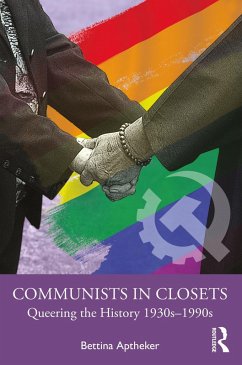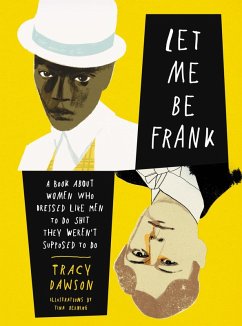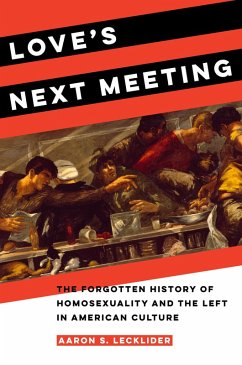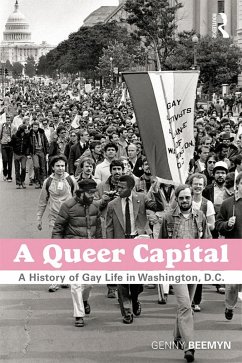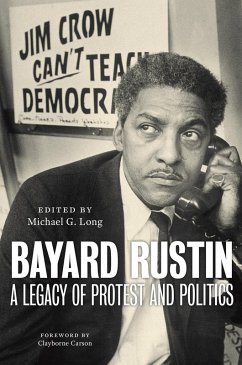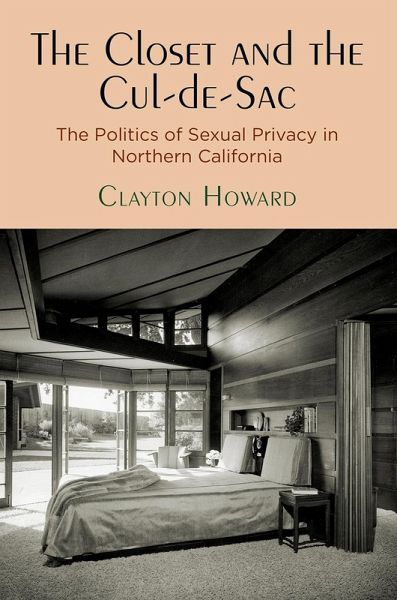
The Closet and the Cul-de-Sac (eBook, ePUB)
The Politics of Sexual Privacy in Northern California
Versandkostenfrei!
Sofort per Download lieferbar
37,95 €
inkl. MwSt.
Weitere Ausgaben:

PAYBACK Punkte
19 °P sammeln!
The right to privacy is a pivotal concept in the culture wars that have galvanized American politics for the past several decades. It has become a rallying point for political issues ranging from abortion to gay liberation to sex education. Yet this notion of privacy originated not only from legal arguments, nor solely from political movements on the left or the right, but instead from ambivalent moderates who valued both personal freedom and the preservation of social norms.In The Closet and the Cul-de-Sac, Clayton Howard chronicles the rise of sexual privacy as a fulcrum of American cultural...
The right to privacy is a pivotal concept in the culture wars that have galvanized American politics for the past several decades. It has become a rallying point for political issues ranging from abortion to gay liberation to sex education. Yet this notion of privacy originated not only from legal arguments, nor solely from political movements on the left or the right, but instead from ambivalent moderates who valued both personal freedom and the preservation of social norms.
In The Closet and the Cul-de-Sac, Clayton Howard chronicles the rise of sexual privacy as a fulcrum of American cultural politics. Beginning in the 1940s, public officials pursued an agenda that both promoted heterosexuality and made sexual privacy one of the state's key promises to its citizens. The 1944 G.I. Bill, for example, excluded gay veterans and enfranchised married ones in its dispersal of housing benefits. At the same time, officials required secluded bedrooms in new suburban homes and created educational campaigns designed to teach children respect for parents' privacy. In the following decades, measures such as these helped to concentrate middle-class families in the suburbs and gay men and lesbians in cities.
In the 1960s and 1970s, the gay rights movement invoked privacy to attack repressive antigay laws, while social conservatives criticized tolerance for LGBTQ+ people as an assault on their own privacy. Many self-identified moderates, however, used identical rhetoric to distance themselves from both the discriminatory language of the religious right and the perceived excesses of the gay freedom struggle. Using the Bay Area as a case study, Howard places these moderates at the center of postwar American politics and shows how the region's burgeoning suburbs reacted to increasing gay activism in San Francisco. The Closet and the Cul-de-Sac offers specific examples of the ways in which government policies shaped many Americans' attitudes about sexuality and privacy and the ways in which citizens mobilized to reshape them.
In The Closet and the Cul-de-Sac, Clayton Howard chronicles the rise of sexual privacy as a fulcrum of American cultural politics. Beginning in the 1940s, public officials pursued an agenda that both promoted heterosexuality and made sexual privacy one of the state's key promises to its citizens. The 1944 G.I. Bill, for example, excluded gay veterans and enfranchised married ones in its dispersal of housing benefits. At the same time, officials required secluded bedrooms in new suburban homes and created educational campaigns designed to teach children respect for parents' privacy. In the following decades, measures such as these helped to concentrate middle-class families in the suburbs and gay men and lesbians in cities.
In the 1960s and 1970s, the gay rights movement invoked privacy to attack repressive antigay laws, while social conservatives criticized tolerance for LGBTQ+ people as an assault on their own privacy. Many self-identified moderates, however, used identical rhetoric to distance themselves from both the discriminatory language of the religious right and the perceived excesses of the gay freedom struggle. Using the Bay Area as a case study, Howard places these moderates at the center of postwar American politics and shows how the region's burgeoning suburbs reacted to increasing gay activism in San Francisco. The Closet and the Cul-de-Sac offers specific examples of the ways in which government policies shaped many Americans' attitudes about sexuality and privacy and the ways in which citizens mobilized to reshape them.
Dieser Download kann aus rechtlichen Gründen nur mit Rechnungsadresse in A, D ausgeliefert werden.





